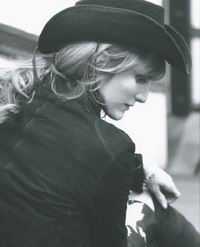"When you write a song based on a story from your past, it's a way to go back and take a look at where your compass was set," Patti Scialfa explains. "To see if you're still on course, or if that setting is still relevant--that's what's interesting to me." On 23rd Street Lullaby, Scialfa delves into her personal history to create a sort of musical memoir of a time when life ran wild and deep. She uses that period to frame struggles between faith and failure, strength and surrender, standing up and giving in. 23rd Street Lullaby is populated by lotharios, rebels, dreamers, realists--but, most of all, by Patti Scialfa herself, who sees all these characters in the most personal perspective.
The time: the late Seventies and early Eighties. The place: Manhattan's Chelsea district--a neighborhood in the West 20s that now plays home to fancy coops and galleries. Back then, the place was a slightly grubby arm of artistic bohemia: "In my eyes, it always had a bit of that Parisian Left Bank feel. A lot of my musician friends lived on the same street as me," Patti recalls. "I realize how lucky it was to have that sense of community."
The New Jersey native with a just-earned degree from NYU had come to the city to test her music. She paid early dues on the street--literally. She developed a favorite busking spot on Sheridan Square, in the heart of Greenwich Village. "It was tough playing on a corner filled with this tremendous amount of noise and input, but it was so empowering, so freeing," she says. "I was doing my own music, making my living my own way, on my own terms."
Soon, Patti became a regular on the city's club scene as well, working on her own and with a circle of friends. Occasional waitress stints paid the rent. As her talent became better known, she found work backing up David Johansen, Southside Johnny & the Asbury Jukes, even the Rolling Stones.
When Bruce Springsteen asked her to join the E Street Band in 1984 for the "Born In The USA" world tour, she took the gig. Meantime, she continued to write her own material and made demos that earned her a contract with Columbia Records who released her debut album, Rumble Doll, in 1993.
"Rumble Doll was a love letter full of questions," Patti reflects. "Those songs showed people struggling to find the courage to reveal themselves to another person. It was almost like a journal that you'd write late at night." For all its intimacy, the album won her critical acclaim and an avid, if small, fan-base.
"23rd Street Lullaby has more confidence to it--and it's not afraid to have a little fun!," she says. But that's not as simple as it sounds, due to her thoughtful commitment to both musical and emotional clarity. "It was not a quick record to make; it was a bit elusive," Patti says. "To tell the story I wanted to tell and do it musically, I had to chase the tale a bit. On the other hand, I wrote all the songs before I went into the studio."
Then she called on some old friends--many of them she first bonded with back in Chelsea. "I didn't want to expose myself to people I didn't know when in such a state of flux and search," she explains. Enter Steve Jordan (who recently served as musical director for the PBS series, "Martin Scorsese Presents the Blues," helmed Robert Cray's Best Contemporary Blues Album Grammy-winning Take Your Shoes Off, and has produced albums by Keith Richards, the Jon Spencer Blues Explosion and others) to play drums and co-produce with Patti. Soozie Tyrell, with whom Patti gigged back in their busking days, came aboard to sing backup and play violin. Clifford Carter, the James Taylor sideman that Patti's worked with since her club days, added keyboards. Nils Lofgren, who joined the E Street Band the same year Patti did, brought his guitars. "Even my husband did a few things here and there."
In working with these musicians, Patti again found a very intimate feel. "All the players on this record have songwriting experience," she explains. "When you're able to work with musicians who play so beautifully and are songwriters as well, they're very much in tune with you because they listen lyrically as well as musically."
23rd Street Lullaby has the effect of moving a listener through a house that's also a home, a place where one door opens as another closes. "All those experiences, whether they were painful or rewarding, served me as self-discovery," says Scialfa. "The theme of this record is the antithesis of perfection. It's about acceptance, and how you learn to trace your footsteps in order to express who you are today."
Source: http://www.pattiscialfa.net/
